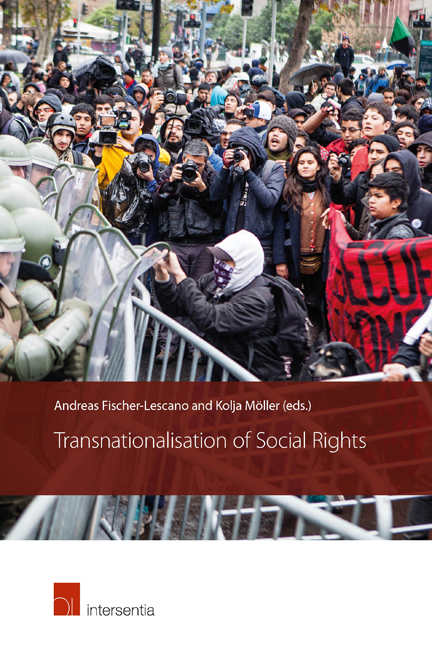Book contents
- Frontmatter
- Contents
- List of Contributors
- List of Abbreviations
- Chapter 1 Introduction
- PART I TRANSNATIONAL SOCIAL RIGHTS IN CONTEXT
- PART II FOUNDATIONS, INSTITUTIONS AND ENFORCEMENT STRUCTURES
- PART III ENFORCEMENT OF TRANSNATIONAL SOCIAL RIGHTS
- Chapter 8 Transnational Socio-Economic Rights: Inter-Linkages in the Context of the Right to Food
- Chapter 9 Agroenergy and the Right to Food: The EU Biofuel Mandate and Transnational Social Rights
- Chapter 10 Between Rights and Power Asymmetries: Contemporary Struggles for Land in Brazil and Colombia
- Chapter 11 The Zapatista Struggle for the Right to Land: Background, Context and Strategies
- Index
Chapter 10 - Between Rights and Power Asymmetries: Contemporary Struggles for Land in Brazil and Colombia
from PART III - ENFORCEMENT OF TRANSNATIONAL SOCIAL RIGHTS
Published online by Cambridge University Press: 12 December 2017
- Frontmatter
- Contents
- List of Contributors
- List of Abbreviations
- Chapter 1 Introduction
- PART I TRANSNATIONAL SOCIAL RIGHTS IN CONTEXT
- PART II FOUNDATIONS, INSTITUTIONS AND ENFORCEMENT STRUCTURES
- PART III ENFORCEMENT OF TRANSNATIONAL SOCIAL RIGHTS
- Chapter 8 Transnational Socio-Economic Rights: Inter-Linkages in the Context of the Right to Food
- Chapter 9 Agroenergy and the Right to Food: The EU Biofuel Mandate and Transnational Social Rights
- Chapter 10 Between Rights and Power Asymmetries: Contemporary Struggles for Land in Brazil and Colombia
- Chapter 11 The Zapatista Struggle for the Right to Land: Background, Context and Strategies
- Index
Summary
INTRODUCTION
Many factors explain the current increasing visibility of land conflicts in Latin America. To begin with, this intensification involves a re-configuration of conflicts that date back to the European colonisation of Latin America and to the expropriation from the original populations during this period. Over the centuries, these conflicts have taken on new forms, following the variations of capital accumulation dynamics and the changes in legislation and policies that regularise land ownership and use.
The recent re-positioning of Latin America within the global division of labour, marked by the growing importance of a new mix of commodities on the regional export agenda, aggravates these existing conflicts. Lands that previously had little value, and that are far away from the larger settlements, come to be disputed to such a degree that the exploration of their subsoil or surface to cultivate agricultural products has transformed them into a promising source of profit.
Additional reasons for these land conflicts are the search for new energy sources and the expansion of transportation and communication infrastructures. In this regard, the growing production of agro-fuels and the expansion of the areas occupied by hydro-electric dams, in addition to new highways, railroad lines, electrical transmission lines, etc., transform the way in which large extensions of land are used and in many cases lead to the removal of the traditional occupants from these areas. A similar process can be observed in negotiations regarding climate change control or national/local initiatives to compensate for the environmental impact of human activities (through the creation of parks, protected areas, etc.). These measures impose limits on land use and restrict opportunities for the survival of the resident populations. In other cases, these populations are transformed into guardians of the areas integrated to the imagined global environmental patrimony, and are financially compensated to do so.
Finally, the growing interest in the speculative use of lands should also be emphasised. It is well known that land is a traditional instrument of value – and not only in Latin America. In the conjunctures of the current economic crisis and the strong volatility of financial applications, the importance of speculative investments in land has grown dramatically, aggravating local conflicts.
- Type
- Chapter
- Information
- Transnationalisation of Social Rights , pp. 239 - 264Publisher: IntersentiaPrint publication year: 2016



